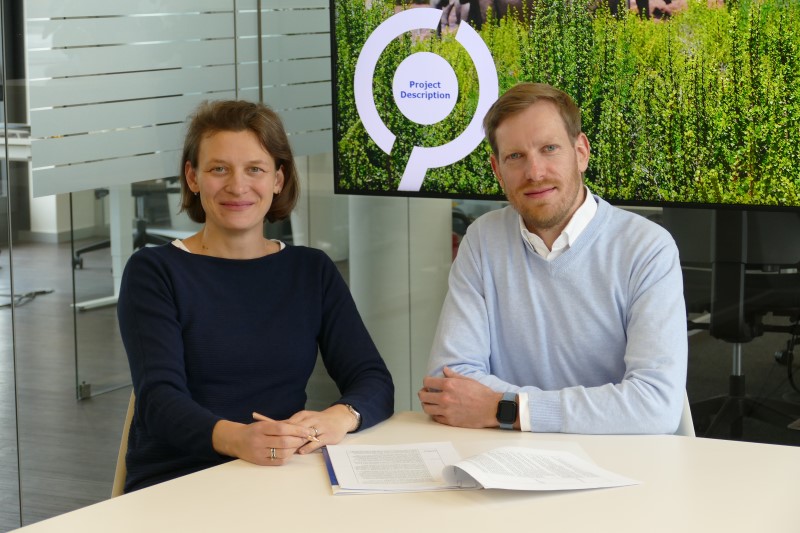
Interview with Katharina Latif and Robin Stoffers, Managing Directors of ClimatePartner Impact
ClimatePartner's new project development subsidiary
ClimatePartner Impact (CPI) develops high-quality climate projects according to international standards: from the initial conception to the issuance of verified emission reductions. By financing these projects – beyond carbon reduction – ecosystems are protected and the living conditions of local communities are improved.
Mona-Kira Prestel from ClimatePartner sat down with the Managing Directors of CPI, Katharina Latif and Robin Stoffers, to discuss CPI’s focus and how companies can get involved in global climate action.
Mona-Kira Prestel: The name already suggests it, but what exactly does ClimatePartner Impact stand for?
Katharina Latif: ClimatePartner Impact stands for the fact that we develop climate projects ourselves. And that these climate projects, apart from making a positive contribution to the climate, should also add value locally. This can be an additional ecological or social benefit to the community. And this added value is not just there by chance, but it is planned and measurable.
Robin, you have just returned from a project visit to Africa. What impressions did you bring back to Germany?
Robin Stoffers: I always find it fascinating that the climate action aspect does not play such a big role for those involved in the project. What is important for them is that they have jobs or that their fields are not washed away. I was just in Rwanda, where we are doing a reforestation project that secures the riverbanks and prevents future erosion. And that helps the local farmers and their families a lot. For them, it is of secondary importance how much carbon is stored there. These are people who, in some cases for the first time, have a regular job and see the benefits of the project for their community and the farmers. These impressions are the reward for our daily work.
You have been active in climate action for a long time, how did you get into it?
Robin Stoffers: I studied geography, so the environment and the connections between people and nature have been close to my heart since I was a student. I first worked in the field of renewable energy, then I worked on a large infrastructure project in soil conservation and environmental protection before joining ClimatePartner.
Katharina Latif: I have always been interested in the topic of environmental protection. I studied international economics and specialised in climate protection and ESG. Then I added a Master's degree in environmental technology and energy policy. I then worked for Allianz for a long time and, among other things, built up the entire environmental, social, and corporate governance structure, plus was responsible for the sustainability area.
If a company wants to become active in this area, how can they directly take climate action?
Robin Stoffers: We do an incredible amount of good with the climate projects and that is very valuable. But fundamentally, we have to make sure that the emissions don't occur in the first place. We simply need to follow a holistic approach, meaning reducing and avoiding emissions and then also investing in new projects at the same time. The additional investments create a real contribution to climate action and beyond.
Katharina Latif: We offer companies the opportunity to invest directly in climate projects. Our offer is that a company makes a long-term commitment, co-finances projects in advance, and then supports projects of the highest possible quality at predictable prices, obtaining the certificates from them.
You mention impact investing, Katharina. Why is that so important, or is that the key to making the project happen?
Katharina Latif: Absolutely. Without the pre-financing I just mentioned, the project would not happen at this point. This is important because every climate project must be additional. So the impact logic goes in the direction of saying: you finance a project that intentionally and also measurably delivers additional value, beyond the financial return.
What do you want from companies?
Katharina Latif: What I would like to see is that climate action measures are seen less from a charitable, philanthropic perspective, in the sense of donating a little money to charity. Companies should rather look at active climate action from a financial perspective. That's why we talk about impact investments.
Robin Stoffers: Have the courage, just start, whatever the scale.
How are you feeling about the future?
Robin Stoffers: I look positively into the future. Everyone is aware of the issue and many want to do something and not just talk about it. I see this every day in our clients and in our motivated colleagues. ClimatePartner Impact is there to help and offer opportunities. The market is developing and successfully meeting the challenges. Moreover, there is no alternative to creating result-oriented positive impact.
Katharina Latif: I am positive about the future, too. Having worked in the environmental field for 20 years, I am a born optimist anyway. I see a lot of initiative in the economy, I see a lot of great start-ups that are trying to bring environmental protection into the mainstream through innovative ideas. That gives me hope. And ultimately I also see, through every single one of our climate projects, how much added value we create locally. And that is very positive.
Would you like to know more about climate projects? Get in touch!
